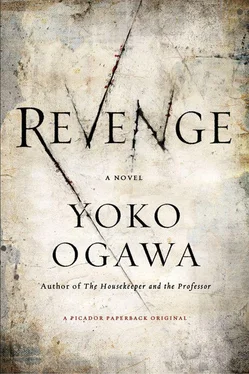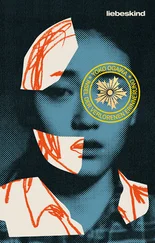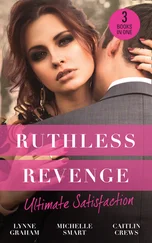* * *
“That’s right. Stand just a little closer together. Now, big smile!”
The reporter’s voice echoed through the courtyard as he focused his camera. Perhaps he thought Mrs. J was hard of hearing. “Hold the carrot just a bit higher … by the greens so we can see all five fingers. That’s it, now don’t move.”
We were posing right in the middle of the vegetable bed, the reporter trampling on pine needles as he positioned himself for the shot. The other tenants peered curiously from their windows.
I tried to smile, but I couldn’t. It was all I could do to keep my eyes open in the blinding sunlight. My mouth, my arms, my eyes—everything seemed to be coming apart and I felt terribly awkward. And thanks to the massage, I hurt all over.
“Pretend you’re saying something to each other. Just relax … and turn the carrot this way … It’s all about the carrot!”
Mrs. J had done her best to dress up for the occasion. She had put on lipstick and wrapped a scarf over her head. The hem of her dress came almost to her ankles, and she wore a pair of old-fashioned high heels instead of her usual sandals.
But the scarf only emphasized her narrow face, the lipstick had smeared, and somehow her formal dress and heels seemed to clash with the carrots.
“Make us look good,” she told the reporter. “In all my years, I’ve never once been in the newspaper.” She let out a husky laugh, and her smile pinched up the wrinkles around her eyes.
The article ran in the regional section of the paper the next morning: CURIOUS CARROTS! HAND-SHAPED AND FRESH FROM GRANNY’S GARDEN!
Chest thrust forward to compensate for her slight frame, Mrs. J stood, listing a bit to the right as her high heel dug into the earth; and though she had laughed during much of the photo session, in the picture she looked almost frightened. But the carrot cradled in her hands was perfect.
I stood next to her, holding a carrot of my own. In the end, I had managed a smile of sorts, but my eyes looked off in a random direction and I was clearly tense and uncomfortable.
The carrots appeared even stranger in the photograph, like amputated hands with malignant tumors, dangling in front of us, still warm from the earth.
* * *
“Did you ever meet her husband?” the inspector asked.
“No, I just moved into the building,” I answered.
“Did she tell you he was dead?” asked another officer.
“Yes, she said he had been drinking and had fallen into the sea and died … Or maybe she just said that he was missing. I don’t really remember. We weren’t really very close…”
I glanced out at the courtyard. Mrs. J’s apartment was empty. The single curtain fluttered in the window.
“Any little detail could be helpful. Did you notice anything suspicious?” said a young policeman, bending down to meet my gaze. “Anything at all?”
“Suspicious?” I said. “Suspicious … Once, in the middle of the night, I saw someone running down through the orchard … carrying a heavy box. They took it into the post office, the abandoned one at the bottom of the hill.”
* * *
The post office was searched and found to contain a mountain of kiwis. But when the fruit was cleared out, it revealed only the mangy body of a cat. Then a backhoe was brought in to turn up the garden, releasing a suffocating odor of pine needles. The tenants at their windows covered their noses.
As the sun fell behind the trees in the orchard, the shovel uncovered a decomposing body in the vegetable patch. The autopsy confirmed that it was Mrs. J’s husband and that he had been strangled. Traces of his blood were found on her nightgown.
The hands were missing from the corpse, and they never turned up, even after the whole garden had been searched.
The train was full. Every seat was taken and people were standing between cars. The heater seemed to be broken and my legs were cold.
A dozen or so children in navy blue blazers and berets were sitting in the front of the car. The girls had ribbons around their necks and the boys wore bow ties. The man who seemed to be in charge of the children was absorbed in a thick book, but from time to time he would look up to check on them.
For nearly an hour, we had been waiting there, but the conductor just kept repeating the same announcement over the public address system, that there were mechanical difficulties and it would be some time still before we were moving again.
Although it was spring and the cherry trees along the track were just beginning to bloom, it had suddenly started to snow. Just a flurry at first, but after a while it showed no sign of letting up, and grew heavier as I watched. In no time at all, everything was blanketed in white.
“I’ll be late for Mama’s funeral,” I murmured to myself. Glancing at my watch, I rubbed the fog from the window. My fingers were cold and wet.
* * *
I had learned of Mama’s death from my girlfriend, who worked as an editor for an arts-and-crafts magazine.
“That writer, the one you said was your stepmother for a while … she died,” she told me. “From a heart attack, the day before yesterday. I’m sorry, I probably shouldn’t have told you.” I could tell she wanted to avoid hurting me.
I had called the woman my mother only from the time I was ten until I turned twelve. Just about the same age as the kids in the front of the train car—and almost thirty years ago now. But it had been the only time in my life that I’d had anything like a real mother.
My biological mother had died shortly after giving birth to me. She had scratched a pimple inside her nose and it had become infected.
“The nose is close to the brain.” This had been my father’s way of explaining what had happened. “You have to be careful. Germs can get right into the brain through the nose.”
Which is why I have always been terrified of going to the ear-nose-and-throat doctor. When they insert that crooked tube in my nose, I can’t escape the thought that it will go right through and stick into my brain.
I had no memory of my real mother, no idea what a mother was. Until that woman came to live with us, a mother to me was no more than a metallic sensation in the back of my nose.
My father’s new wife was a young woman, just fourteen years older than me, who worked in an art supply shop. He was a middle school art teacher, and it seemed he did a lot of business with the shop.
Mama, as I came to call her, was quiet and petite. Even to the eyes of a child, every feature of her body—neck, fingernails, knees, feet—seemed almost miniature. The first impression I had of her was a pair of tiny shoes I found one day in the entrance hall. They were elegant black high heels, the kind a grown woman wears, but they seemed small enough to fit in the palm of my hand.
Our life as a family got off to an awkward start. We did our best to play the assigned roles—father, mother, son—knowing, though, that if we tried too hard it would never work. It’s strange to think about it now, but even a ten-year-old has a certain kind of common sense.
My father gave Mama a cloisonné pendant he had made in his “studio”—a storeroom next to the art class. It was a hexagon hung on a gold chain with flecks of green, violet, deep red, and yellow, the colors changing with the light. It was small, like her, and she almost never took it off.
She was happy when I called her Mama; it made her feel like a grown-up, she said. So I always called her Mama. Even after they divorced just two years later, she continued to be Mama in my mind.
I was upset, then, a few years later, to discover that I could no longer remember her real name, but I was reluctant to ask my father, who had left no trace of her in his world. So I searched the house, afraid I’d lose all connection to her if I did nothing to conjure her memory. Finally, deep in a drawer, I found the pendant. The colors were as brilliant as ever, and her name was engraved on the back. Relieved, I returned it to the drawer.
Читать дальше












